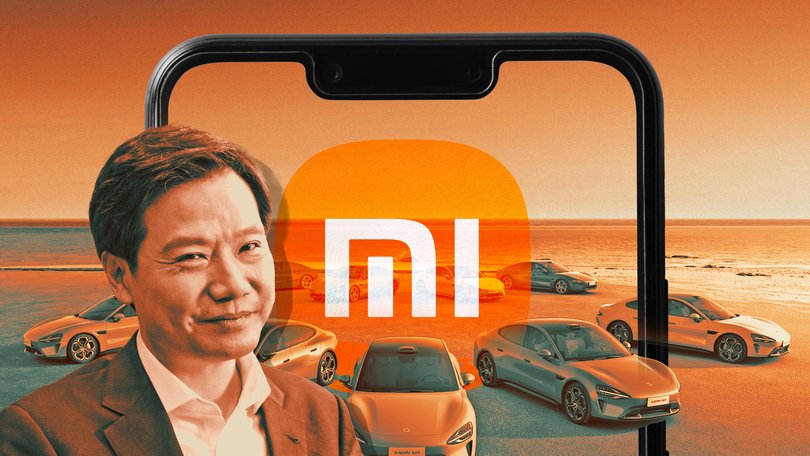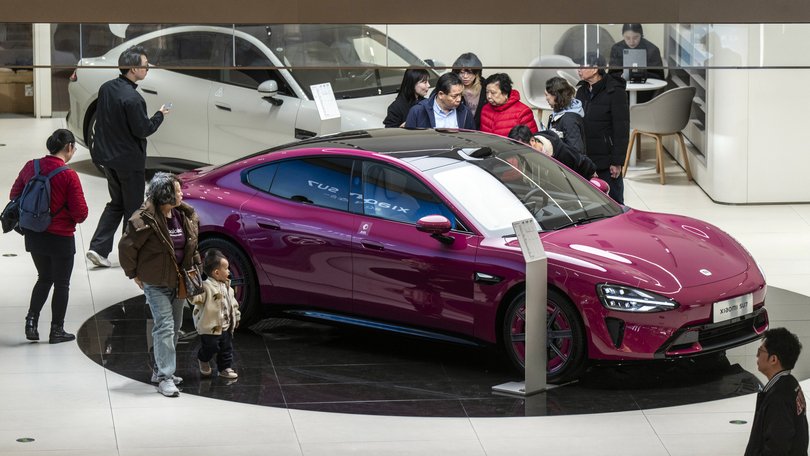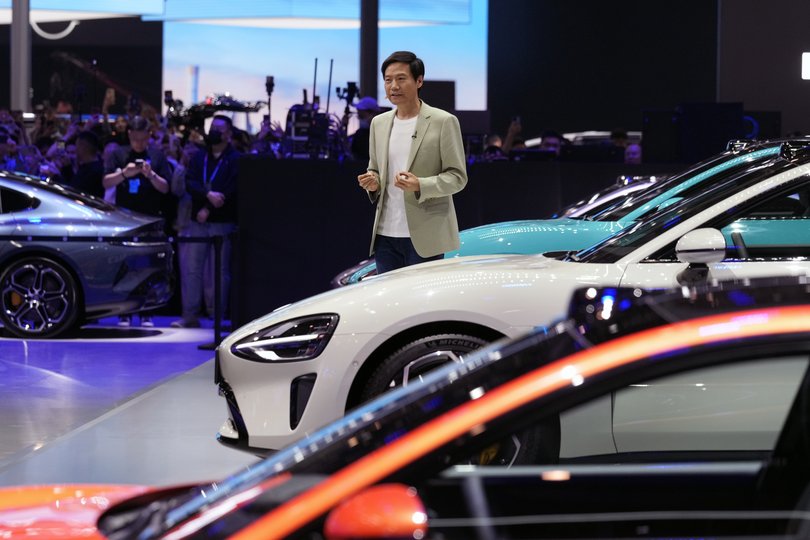THE ECONOMIST: Meet China’s smartphone player who has triumphed where Apple has failed in race to EV market
THE ECONOMIST: Complete with its own charismatic CEO and a cult following, Chinese tech giant Xiaomi has set its sights on world domination.

Ever since he co-founded Xiaomi in 2010, Lei Jun, the chief executive of the Chinese tech giant, has pulled off feat after feat of salesmanship. A decade ago he earned a Guinness World Record for selling 2.1 million smartphones online in 24 hours.
These days, though, he is not just flogging cheap phones. Last month Xiaomi sold more than 200,000 of its first electric SUV, the YU7, within three minutes of bringing it onto the market.
Xiaomi’s rise over the past few years has been vertiginous. Only Apple and Samsung sell more smartphones worldwide.
Sign up to The Nightly's newsletters.
Get the first look at the digital newspaper, curated daily stories and breaking headlines delivered to your inbox.
By continuing you agree to our Terms and Privacy Policy.The company also peddles a vast array of devices that connect to its handsets, from air-conditioners and robo-vacuums to scooters and televisions. After a slump in 2022, which it attributed to “cut-throat competition” in China for consumer electronics,
Xiaomi has roared back to growth, with its revenue increasing by 35 per cent last year. Since the beginning of 2024 its market value has nearly quadrupled, to HK$1.5 trillion ($300 billion).
With the successful release of the YU7 — its second electric vehicle (EV) after the SU7, a sporty sedan launched in March last year — Xiaomi has pulled off a feat that eluded Apple, which ditched plans to make its own EV after burning billions of dollars on the effort over a decade. Xiaomi, which announced its carmaking ambitions in 2021, has put more than 300,000 of its EVs on Chinese roads over the past 15 months, and has a backlog of orders that will take more than a year to fill.
Although its EV division has lost money so far, Mr Lei has said he thinks it will become profitable later this year, an impressive feat in China’s brutally competitive car market.
Xiaomi now has its sights set on world domination. Over the coming years it intends to open 10,000 shops abroad, up from just a few hundred last year, which it will use to show off its sleek new cars alongside its consumer electronics. Can anything stop its stunning ascent?

Xiaomi’s success in EVs is partly down to being in the right place at the right time. China these days is awash in carmaking know-how; Mr Lei was able to nab top talent from a number of other companies. Prices for parts and machinery have plummeted, given the oversupply of both. Getting a factory approved and built can be done far more quickly in China than most other places.
But Mr Lei also deserves plenty of credit. Insiders note that, unlike Apple’s Tim Cook, he took personal control over his company’s carmaking project. Success required deep changes to how the company operated. Prior to its foray into EVs, Xiaomi did not own factories; like Apple, it outsourced the production of its phones and other devices.
Yet it chose to build its own EV factory in Beijing, which it is currently expanding, in order to ensure strict oversight. It is now adopting the approach elsewhere in its business: last year it began producing smartphones itself at another facility in Beijing, and is building a plant in Wuhan where it will make other connected devices, starting with air-conditioners.
Xiaomi’s marketing strategy — which relies heavily on Mr Lei’s cult following in China — has also aided its expansion into EVs, much as adoration for Steve Jobs helped Apple sell its first iPhones. Wuhan University is said to have enjoyed a surge in interest thanks to Mr Lei’s attendance there some 30 years ago. “Mi Fans”, as diehard Xiaomi customers are known, collect company memorabilia and race to get their hands on every new product.
Xiaomi has even managed to sustain the excitement around its EVs despite a horrific accident in March in which three university students were killed in an SU7 that was being piloted down a motorway by the company’s autonomous-driving system. The episode led to criticism of Xiaomi’s safety standards and a temporary sell-off in shares, but they did not quell demand for the YU7 when it was launched three months later.
It also helps that Xiaomi has a vast customer base to which it can hawk new products. At the end of last year it claimed 700m monthly users across its devices globally, up by about 10 per cent from the year before. Many of them play games purchased on Xiaomi’s app store and view ads sold by the company (these generate a half of the company’s total profit, according to Bernstein, a broker). And a sizeable share of users buy their Xiaomi products directly on its app.
The company has already proved adept at persuading them to upgrade to more expensive phones. It needs only a small fraction of them to buy a car for the endeavour to be a huge success. Many of Xiaomi’s Chinese customers were in their early 20s when they bought one of its first smartphones a little over a decade ago. They are now in their mid-30s, the target demographic for Xiaomi’s EVs.

Mr Lei is looking beyond China, too. Nearly half of the revenue the company makes from smartphones and other connected devices comes from overseas, primarily in developing markets such as India and Indonesia.
Mr Lei wants Xiaomi to start selling its EVs abroad by 2027. These will probably not enjoy the kind of rapturous reception they have at home: Xiaomi does not command anything close to the same brand loyalty in foreign markets, and few overseas customers will have heard of Mr Lei. That helps explain why Xiaomi is investing in building a vast network of bricks-and-mortar shops abroad, which should raise its profile.
At the same time, the company plans to continue expanding into new lines of business.
It has developed its own humanoid robot, CyberOne, and in May unveiled an advanced three-nanometre chip it had designed itself. Roughly half of its staff work in research and development, spending on which grew by 26 per cent last year, to $US3.4b ($5.2b) — more than the company generated in net profit. The thinking within the business is that by developing technologies from the ground up, it can identify efficiencies and raise barriers to competition.
Perhaps the biggest risk for Xiaomi is that it is fighting on too many fronts, considering its many products.
The price war among Chinese EV companies continues to intensify, and despite its growth, Xiaomi remains a small player. It currently sells around 20,000 cars a month, compared with more than ten times that for BYD, the market leader.
Competition in smartphones is also heating up as Huawei, another Chinese tech giant whose handset business was hobbled by American sanctions in 2019, makes a comeback. Still, Mr Lei’s salesmanship is not to be underestimated.
Originally published as China’s smartphone champion has triumphed where Apple failed
